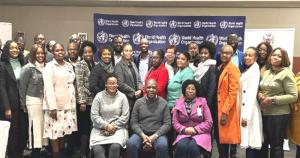Strengthening Namibia’s Healthcare: A Collaborative Approach to Quality Measurement
In a concerted effort to enhance the quality of healthcare services in Namibia, the Ministry of Health and Social Services (MoHSS), supported by the World Health Organization (WHO) and other key stakeholders, has made significant steps in the development, launching and dissemination of the National Quality Policy and Strategy (NQPS) in 2022. The NQPS aimed at ensuring that the provision of quality healthcare services is a fundamental principle of the healthcare delivery system in Namibia.
One of the strategic objectives in the NQPS is to improve the quality management systems, with the intermediate objective being, to strengthen the performance measurement framework at all levels of health care. In 2023, as part of implementing this strategic objective, WHO supported the MoHSS with the development of the draft quality of care monitoring and evaluation framework. The workshop held in Windhoek was attended by participants from the MoHSS Quality Assurance Division and WHO. The workshop included reviewing Namibia's health priorities, quality of care definition, and reviewing the dimensions of quality healthcare services. This review helped to contextualize the development of quality-of-care indicators and ensured that the indicators were aligned with Namibia's health priorities.
A finalization workshop held in Windhoek on 21-22 May 2024, aimed at ensuring that the quality measurement framework is comprehensive, actionable, and aligned with MoHSS’s healthcare improvement goals. The workshop brought together 20 participants from various organizations, including MoHSS’s Quality Assurance Division, WHO, IntraHealth Namibia, Windhoek Central Hospital, UNICEF Namibia, CDC Namibia, Global Programs for Research & Training Namibia, and several MoHSS departments. Participants reviewed a total of 25 initially proposed indicators through a participatory approach, consensus was reached on the most relevant and impactful indicators, while additional suggestions were made for further refinement. Some of the indicators selected include the availability of functional life support equipment, operating theatre to perform emergency surgery, ambulances, number of clinical audits/ mortality reviews conducted, the status of healthcare workers, Hep B immunization and waiting time at the outpatient department.
The finalized framework will serve multiple purposes, including reporting on the quality-of-care progress, generating actionable data, and enhancing health information systems.
Moving forward, consultative meetings with key MoHSS directorates will be conducted to refine the selected indicators, finalize the framework, and integrate the refined indicators into the DHIS2 system. This will ensure standardized monitoring across Namibia’s healthcare system. The finalized quality measurement framework will be published for broader dissemination and utilization, marking a significant milestone in Namibia’s healthcare journey.
The successful collaboration and commitment demonstrated in this initiative highlight the collective dedication to improving healthcare quality and outcomes in Namibia. With continued support and engagement from all stakeholders, Namibia is poised to achieve significant advancements in its healthcare delivery system.
All these was made possible with funding from the Government of Japan, through the partnership with WHO and MoHSS.
